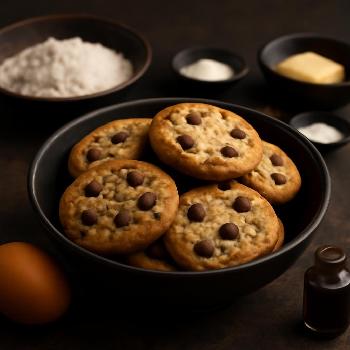Baking & Pastry > Baking Techniques & Tips > Troubleshooting Common Baking Issues > Preventing Tough Cookies
The Secret to Soft and Chewy Cookies
Tired of cookies that are hard and dry? This guide explores common causes of tough cookies and provides simple, effective techniques to ensure a perfectly soft and chewy result every time.

Ingredients
- 2 1/4 cups All-purpose flour
- 1 teaspoon Baking soda
- 1 teaspoon Salt
- 1 cup Unsalted butter, softened
- 3/4 cup Granulated sugar
- 3/4 cup Brown sugar, packed
- 2 Large eggs
- 1 teaspoon Vanilla extract
- 2 cups Chocolate chips
The Right Flour Matters
Using too much flour is a prime culprit for tough cookies. Always measure your flour correctly. The 'spoon and level' method is best: spoon flour into your measuring cup until overflowing, then level it off with the back of a knife. Avoid scooping directly from the bag, as this compacts the flour and results in using too much.
Don't Overmix the Dough
Overmixing develops the gluten in the flour, leading to a tough, chewy cookie (and not in a good way!). Mix the wet and dry ingredients until just combined. A few streaks of flour are okay.
Butter and Sugar: Creaming is Key
Creaming together the butter and sugar is crucial for incorporating air into the dough, which results in a lighter, more tender cookie. Cream them until light and fluffy – about 3-5 minutes on medium speed. Use softened, but not melted, butter.
Chill Out! (Sometimes)
Chilling the dough before baking helps prevent the cookies from spreading too thin and becoming crispy. Chilling also allows the flavors to meld together. For softer cookies, chilling for 30 minutes to an hour is often sufficient. For chewier cookies, chill for longer, even overnight.
Baking Time and Temperature
Overbaking is a common cause of tough cookies. Bake just until the edges are golden brown and the centers still look slightly soft. The cookies will continue to bake on the hot baking sheet after they're removed from the oven. Start checking for doneness at the low end of the baking time.
The Importance of Baking Sheets
Use light-colored baking sheets. Dark baking sheets tend to overbake the bottoms of cookies. Lining your baking sheets with parchment paper also helps prevent overbrowning and makes cleanup easier.
FAQ
-
Can I use melted butter instead of softened butter?
Melted butter will result in flatter, crisper cookies. Softened butter is crucial for creating air pockets and a light, fluffy texture. -
My cookies always spread too thin. What can I do?
Chilling the dough, using the correct amount of flour, and ensuring your butter is not too warm can help prevent spreading. Also, avoid greasing your baking sheet – use parchment paper instead. -
What if I don't have time to chill the dough?
While chilling is beneficial, you can still make good cookies without it. Just be extra careful not to overmix the dough, and watch the baking time closely.
